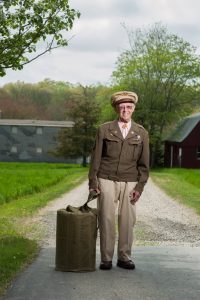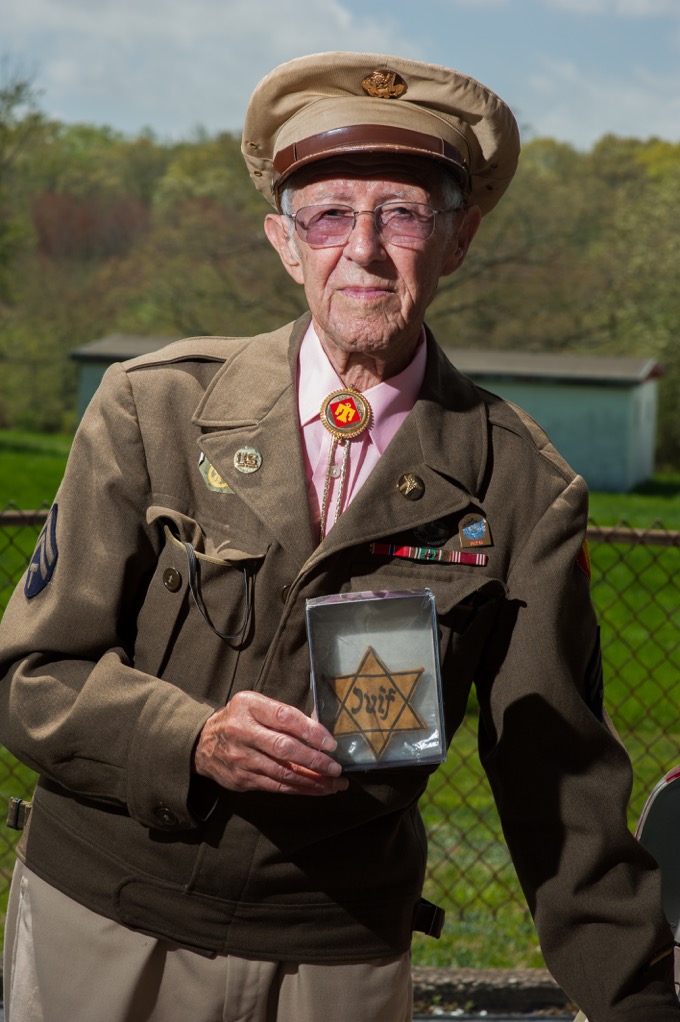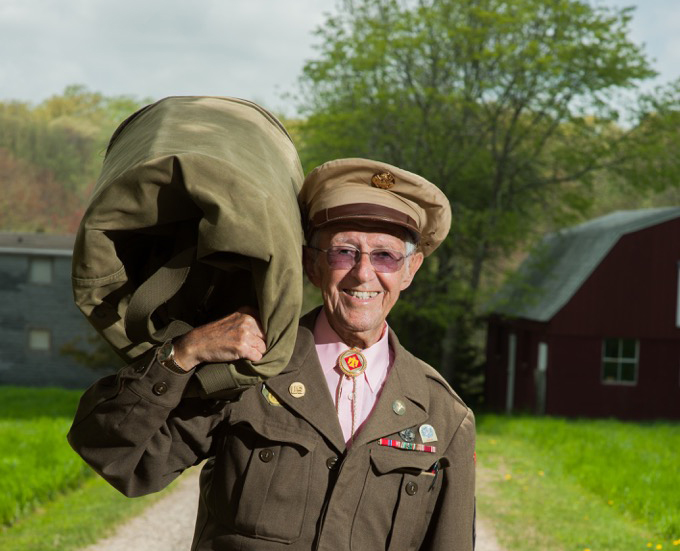In World War II, Ben Cooper, of West Hartford, served with the 45th Infantry Division of General George. S. Patton’s Seventh Army, treating wounded soldiers. But that brutal, heart wrenching work didn’t prepare him for what he witnessed after the U.S. liberated a concentration camp in Dachau, Germany. Here is his story.
This summer marks the 70th anniversary of the end of World War II. Waged in Europe, Africa and Asia beginning in the 1930s, it was a war in which most Americans did not want to get involved, at first. During the 30s, the U.S. suffered through a terrible economic era, the Great Depression. Most Americans believed that the U.S. should work on solving its own problems and not get involved in other countries’ troubles. In 1941, however, when Japan attacked the U.S. naval base at Pearl Harbor in the U.S. territory of Hawaii, American isolationism transformed instantly into a nationwide feeling of patriotism and determination to fight and win the war against the Axis Powers – Japan, Germany, and Italy. After years of war, the U.S., British and Soviet Union-led Allied Powers defeated the enemy in Europe in May of 1945, with the surrender of Germany. In August of 1945, Japan finally stopped fighting and in September formally surrendered after enduring much defeat and devastation, including being attacked by the U.S. with a fierce firebombing campaign and two atomic bombs.
West Hartford resident Ben Cooper served as a medic with the 45th Infantry Division of General George. S. Patton’s Seventh Army. He was drafted in September of 1942, at age 20, assigned to be a medic – he had no medical background, but the Army needed medics, he was told – and was sent to Texas for infantry and medical training. In October of 1943, Cooper was home on furlough in West Hartford, and he met a girl. Dorothy Zaitlin lived in Maine and was in town visiting a friend. She “knocked me off my feet,” Cooper recalls. She had pretty, copper-colored hair, and everyone called her “Coppy.” Cooper talked with her for about 20 minutes, then went home and told his folks that he had met his future wife. They laughed at him, but he was right. The couple married on July 14, 1944, during Cooper’s last furlough before he shipped out to Europe. Coppy Cooper continued to live with her parents in Maine, hoping and praying that her husband would survive the war.
 Coppy had good reason to worry — Cooper worked right behind the battlefront, tending to the wounded solders. Cooper followed the infantrymen as they fought their way from German-occupied France, into Germany and across Germany to Nuremburg and Munich, which they captured in April of 1945. The Germans were determined to defend their homeland, and the fighting was fierce. Cooper and the other dozen or so medics in his unit would ride behind the infantrymen in jeeps, and when troops were hit with enemy fire, Cooper and the other medics would try to save them. The fellows who survived were trucked back to field hospitals. Cooper attended to burned, disfigured and severely injured boys and young men. It was brutal, heart-wrenching work, but nothing, not even the death and mayhem of battle, could prepare Cooper for what he witnessed at war’s end.
Coppy had good reason to worry — Cooper worked right behind the battlefront, tending to the wounded solders. Cooper followed the infantrymen as they fought their way from German-occupied France, into Germany and across Germany to Nuremburg and Munich, which they captured in April of 1945. The Germans were determined to defend their homeland, and the fighting was fierce. Cooper and the other dozen or so medics in his unit would ride behind the infantrymen in jeeps, and when troops were hit with enemy fire, Cooper and the other medics would try to save them. The fellows who survived were trucked back to field hospitals. Cooper attended to burned, disfigured and severely injured boys and young men. It was brutal, heart-wrenching work, but nothing, not even the death and mayhem of battle, could prepare Cooper for what he witnessed at war’s end.
Adolph Hitler, leader of the Nazi Party, took power step by step and by 1933 became Chancellor of Germany. Within months, his paramilitary police force, the SS, began brutalizing and overtaking local German governmental offices. He opened the first of what would be dozens of concentration camps and sub-camps, and he instituted the first boycott of Jewish businesses. By 1934, Hitler had complete control over Germany.
Hitler believed that the Germans were a superior race of human beings and as such were entitled to occupy most of Europe, which they would take by force from what he considered to be inferior races, such as the Slavs and the Poles.
When Hitler’s forces invaded Poland in 1939, marking the start of the war in Europe, they arrested thousands of religious, intellectual and community leaders and killed them.
They forced more than one million Poles from their homes to make room for Germans. Hitler planned to abolish all but the most rudimentary education in Poland and reduce the country to a slave nation in service to the Germans.
Hitler had different plans for European Jews. Though some historians believe Hitler thought Jews were an inferior people, others think Hitler saw them as a threat. Hitler realized that Judaism contradicted and thus threatened his basic notion that some “races,” particularly Germans, were superior. He also believed that Jewish people, many of whom were prominent in Germany, would try to undermine the Nazis and might succeed. Step by step, beginning with boycotts, racist propaganda and institutionalized mistreatment of Jews, Hitler’s Nazi Party eventually formed a plan to systematically murder each and every one of them in Europe. Tragically, he was hugely successful.
Throughout the war, Jewish people from twenty European countries were executed by military units or were taken to concentration and labor camps where they were shot; some were starved, mistreated and tortured at camps until they died; others were shipped to death camps, specifically built to kill Jewish people. At these killing factories, men, women and children were marched into airtight chambers and murdered with poisonous gas.

Approximately six million Jews were killed during the war. According to the United States Holocaust Memorial Museum, 91 percent of the Jewish population in Poland was killed; in Greece, it was 87 percent; in Lithuania, 85 percent; in Romania, 84 percent; in Latvia, 84 percent; in Slovakia, 80 percent; in Hungary, 74 percent; in the Netherlands, 71 percent; in Bohemia Moravia, 60 percent; in Luxembourg, 55 percent; in Belgium, 45 percent; in Norway, 45 percent; in Estonia, 44 percent; in the USSR, 36 percent; in Germany, 36 percent; in Austria, 35 percent; and in France, 22 percent
In addition to decimating the European Jewish population, the Nazis systematically killed gay people and a group of Europeans with Indian heritage who were known as Roma or Gypsies. The Nazis also killed and performed medical experiments and wanton, sadistic acts on those they deemed inferior in some way.
During the final months of the war in Europe, as the U.S. and other Allied forces fought their way across German-occupied Poland and into the German homeland, they began to discover the concentration camps. Starved, brutalized and emaciated people lay dying, and disease was rampant. In April of 1945, Allied Supreme Commander General Dwight D. Eisenhower wrote that he visited a camp near Gotha, Germany, in order to bear witness in case anyone ever tried to deny the Nazi atrocities. Conditions were so unspeakably horrific that General Patton, the great, brave battle commander, could not bear to go into the camp, according to Eisenhower.
Eisenhower suggested that the military fly leaders of the U.S. Congress and prominent members of the press to Germany to certify the atrocities at the camps. He wanted soldiers to bear witness as well. Cooper’s unit was ordered to liberate the concentration camp near Dachau, Germany. American soldiers shot any Nazi guards who would not lay down their guns, imprisoned the rest and took control of the camp. Since Cooper was a medic, he was not present on the day of the liberation, April 29, 1945.
But two days later, Cooper was among those ordered to Dachau to authenticate the mind-boggling evil the Nazis committed there. Cooper was so traumatized by what he saw that he could not discuss it – even with his wife, parents or children – for 25 years.
In 1990, Cooper, began to speak publicly about the atrocities he witnessed, in part to make sure that they are not forgotten or denied and to help himself heal. His son Richard, who is retired, helps his father on his mission. Cooper, now 93, lost Coppy on August 29, 2009. But whenever he is asked to speak to a group, he and Richard pack up their car with artifacts Cooper collected during the war, which are stored in the Connecticut Armory, and Cooper tells his story.
Theresa Anzaldua, of Farmington, is the author of We Had a Job to Do – A Basic History of World War II Through the Eyes of Those Who Served. The book is available at Harvard.com and on Amazon. Her mother, Mary Crumpler, served in World II in the Women’s Army Corps.






More Stories
Hospital for Special Care’s Ivan Lendl Adaptive Sports Camp
Special Olympics Connecticut: Supporting and Inspiring a Special Community
Healing Meals: Supporting Nourishment During a Health Crisis and Beyond